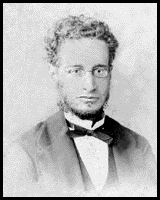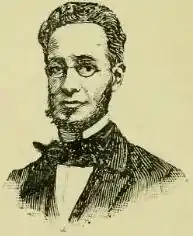Francisco Otaviano
Francisco Otaviano de Almeida Rosa (26 June 1825 – 28 May 1889) was a Brazilian poet, lawyer, diplomat, journalist and politician. He is famous for translating into Portuguese works by famous writers such as Horace, Catullus, Lord Byron, William Shakespeare, Percy Bysshe Shelley, Victor Hugo and Johann Wolfgang von Goethe, mostly of them for the first time.
Francisco Otaviano | |
|---|---|
 A photograph depicting Otaviano | |
| Born | Francisco Otaviano de Almeida Rosa 26 June 1825 Rio de Janeiro, Empire of Brazil |
| Died | 28 May 1889 (aged 62) Rio de Janeiro, Empire of Brazil |
| Occupation | Poet, lawyer, politician, diplomat, journalist |
| Nationality | Brazilian |
| Alma mater | University of São Paulo |
| Literary movement | Romanticism |
He is the patron of the 13th chair of the Brazilian Academy of Letters.
Life
Otaviano was born in Rio de Janeiro in 1825, to Otaviano Maria da Rosa, a doctor, and Joana Maria da Rosa. He entered the Faculdade de Direito da Universidade de São Paulo in 1841, graduating in 1845. Returning to Rio, he started to collaborate for newspapers such as Sentinela da Monarquia, the Official Gazette of the Empire of Brazil, Jornal do Commercio and Correio Mercantil.
From 1867 to 1869 he was the deputy (later senator) of the Empire of Brazil, and served as the negotiator of the Treaty of the Triple Alliance among Brazil, Argentina and Uruguay.[1]
He died in 1889.
Works

- Inteligência do Ato Adicional (1857)
- As Assembleias Provinciais (1869)
- Cantos de Selma (1872)
- Traduções e Poesias (1881)
His most famous poem is "Ilusões da vida" ("Illusions of the life").
| Portuguese | English |
|---|---|
|
Quem passou pela vida em branca nuvem, |
Who passed through the life in a white cloud, |
References
- "Biography of Francisco Otaviano". Archived from the original on 28 September 2011. Retrieved 2 November 2010.
